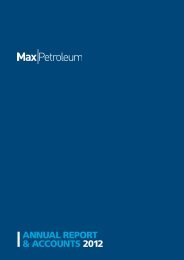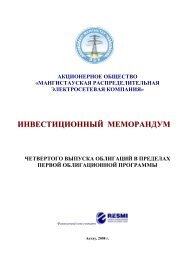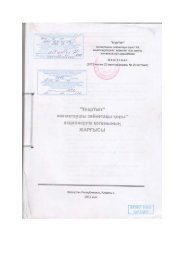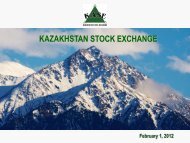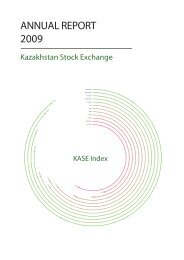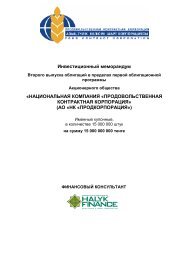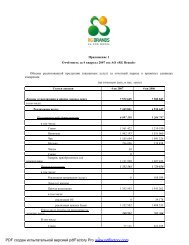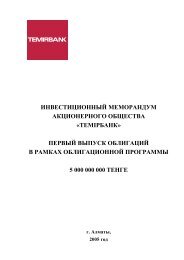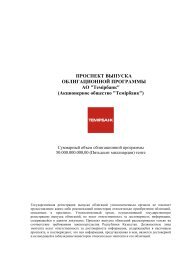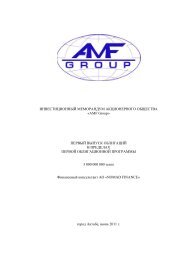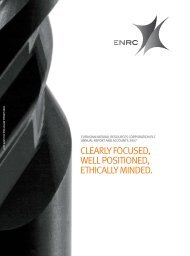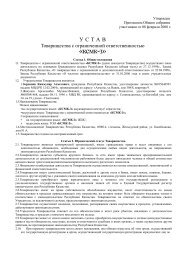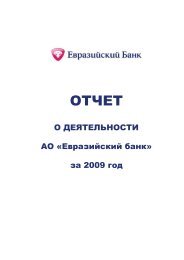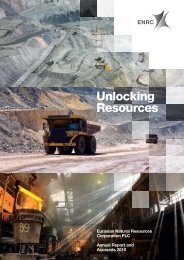JPMorgan - KASE
JPMorgan - KASE
JPMorgan - KASE
Create successful ePaper yourself
Turn your PDF publications into a flip-book with our unique Google optimized e-Paper software.
Losses, damages and liability relating to our properties are not fully covered by insurance.<br />
We currently maintain insurance against losses from business interruption for HKM and damages<br />
or liability for accidents with respect to HKM’s and HOP’s properties. However, the insurance<br />
coverage amount may be insufficient to cover fully all losses, damages or liabilities relating to<br />
HKM’s and HOP’s properties. In addition, as policies come up for renewal, we will need to<br />
evaluate, based on pricing and other terms, which coverages we are willing to renew. Desired<br />
coverage for business interruption, for example, may not be available on satisfactory terms. The<br />
occurrence of significant events against which we are not, or are not fully, insured, or of a<br />
number of lesser events against which we are fully insured but subject to substantial deductibles,<br />
could materially and adversely affect our business, financial condition and results of operations.<br />
We conduct some of our operations through joint ventures.<br />
We currently have a 50% interest in two joint ventures, Kazgermunai, the operator of the<br />
Akshabulak, Nurali and Aksai fields, and Turgai Petroleum, the operator of Kumkol North, and<br />
may in the future enter into further joint ventures as a means of conducting our business. We<br />
cannot fully control the operations and the assets of our joint ventures, nor can we make major<br />
decisions with respect to our joint ventures unless our joint venture partners agree. Accordingly,<br />
although we have the ability to veto decisions with respect to our joint ventures, we are not in a<br />
position to make unilateral decisions. This may constrain the ability of our joint ventures to take<br />
action. For example, the purchase order for a new process facility for the Akshabulak field<br />
operated by Kazgermunai is currently subject to delay by our joint venture partners pending<br />
assurances from the Kazakhstani government to our joint venture partners with respect to<br />
certain marketing and transportation issues. We recently commenced an arbitration proceeding<br />
against our two German partners over a dispute concerning amounts due to the joint venture in<br />
respect of crude oil purchases made by such partners. Under the terms of the indenture, we will<br />
be permitted to continue to make investments in joint ventures. See “Business and Properties —<br />
Corporate Development”, “Description of the Notes — Certain Covenants — Restricted<br />
Payments” and the definition of “Permitted Investments” in “Description of the Notes — Certain<br />
Definitions”.<br />
Our crude oil is transported through a single processing unit.<br />
All crude oil from our producing properties is gathered at our Central Processing Facility, or CPF,<br />
and then transported for export or refining at our refinery in Shymkent. Accordingly, any<br />
significant production problems or adverse change in our CPF could have a material adverse<br />
effect on our financial condition and results of operations.<br />
We depend on the Shymkent refinery for all of our refining activities.<br />
All of our refining activities are conducted at the Shymkent refinery. Refining operations are<br />
subject to inherent risks including fires, floods, accidents and explosions. As a result, our refining<br />
operations could experience significant interruption if the refinery or the distribution systems<br />
that it utilizes experienced a fire, flood, major accident, shutdown or equipment failure, or if it<br />
were damaged by severe weather or other natural disaster.<br />
Our sales of refined products are highly dependent on conditions in the Kazakhstani domestic<br />
market.<br />
During the nine months ended September 30, 2002, approximately 86% of our sales of refined<br />
products were in the Kazakhstani domestic market, a substantial portion of which was in the<br />
southern and eastern regions of Kazakhstan. Accordingly, any adverse change in the economic or<br />
social conditions in the southern and eastern regions of Kazakhstan could have a material<br />
adverse effect on our financial condition and results of operations. See “Risk Factors — Risk<br />
Factors Related to our Operations in Kazakhstan”.<br />
16



